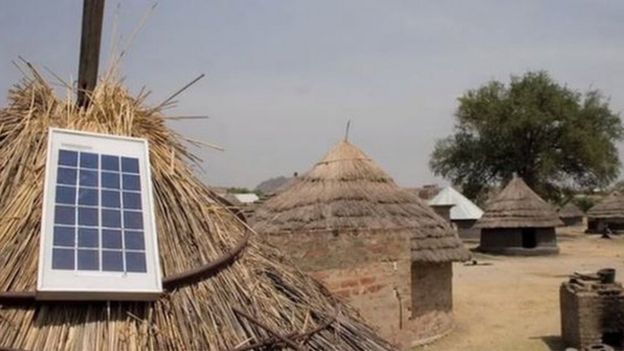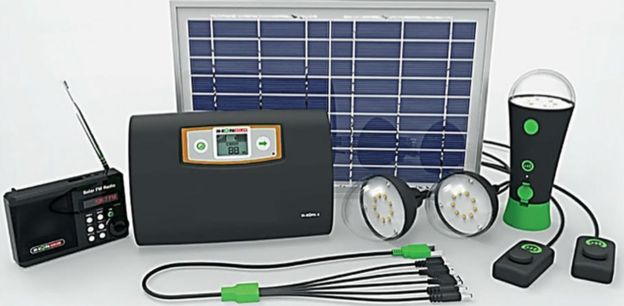Innovation in financing has also been key to the growing adoption of solar energy.
"Pay-as-you-go" and "rent-to-buy" schemes, pioneered by the likes of M-Kopa Solar and Azuri, are helping households pay off the cost of the solar kit over a manageable period.
"Over the course of typically 18 months, the purchase of top-up pays off the cost of the solar home system," says Mr Bransfield-Garth.
"After this, the customer fully owns the system and can use it to access clean, renewable energy with no further cost."
Azuri, which launched in Kenya and has since expanded to other countries, has sold about 80,000 solar home systems so far.
It costs about 220 Kenyan Shillings a week (£1.62; $2.17).
"Azuri's objective is to deliver clean and affordable power to enable rural Africans to realise their aspirations; lighting and mobile phone charging are just the starting point," says Mr Bransfield-Garth.
From light to credit
PEG Ghana, another solar power firm, has connected almost 15,000 homes in the West African country via a pay-as-you-go model. Customers receive a kit made up of two lamps, a radio, a torch, and a mobile phone charger, licensed from M-Kopa Solar.
And the firm now offers customers who have paid off their solar units loans for other items, such as smartphones.
"Before you buy our product, you have a challenge to get anything on credit. You live in the middle of nowhere, you have no credit history, and no collateral," Mr Heller says.
"After you've paid off our system we have one year's worth of data on how you paid off the loan. Now we can give you loans for things like smartphones - you are a safe credit risk," he says.
Business case
"Pay-as-you-go" and "rent-to-buy" schemes, pioneered by the likes of M-Kopa Solar and Azuri, are helping households pay off the cost of the solar kit over a manageable period.
Customers use mobile money services like M-Pesa to credit or top up their solar accounts.
Azuri's PayGo solar panels are helping to bring power to rural communities
"Over the course of typically 18 months, the purchase of top-up pays off the cost of the solar home system," says Mr Bransfield-Garth.
"After this, the customer fully owns the system and can use it to access clean, renewable energy with no further cost."
Azuri, which launched in Kenya and has since expanded to other countries, has sold about 80,000 solar home systems so far.
Its entry level solar panel is a five-watt unit which, with plenty of sun beating down, provides users with about eight hours of lighting for two rooms and mobile phone charging.
A small solar panel is enough to power a laptop
It costs about 220 Kenyan Shillings a week (£1.62; $2.17).
"Azuri's objective is to deliver clean and affordable power to enable rural Africans to realise their aspirations; lighting and mobile phone charging are just the starting point," says Mr Bransfield-Garth.
From light to credit
PEG Ghana, another solar power firm, has connected almost 15,000 homes in the West African country via a pay-as-you-go model. Customers receive a kit made up of two lamps, a radio, a torch, and a mobile phone charger, licensed from M-Kopa Solar.
"We enable customers to replace their perpetual spending on poor-quality polluting fuels, such as kerosene, with solar energy that quickly becomes an asset the customer owns," says Nate Heller, chief operating officer of PEG Ghana.
PEG's starter solar kit includes a radio, torch, lamps and a mobile phone charger
And the firm now offers customers who have paid off their solar units loans for other items, such as smartphones.
"Before you buy our product, you have a challenge to get anything on credit. You live in the middle of nowhere, you have no credit history, and no collateral," Mr Heller says.
"After you've paid off our system we have one year's worth of data on how you paid off the loan. Now we can give you loans for things like smartphones - you are a safe credit risk," he says.
Business case

No comments:
Post a Comment